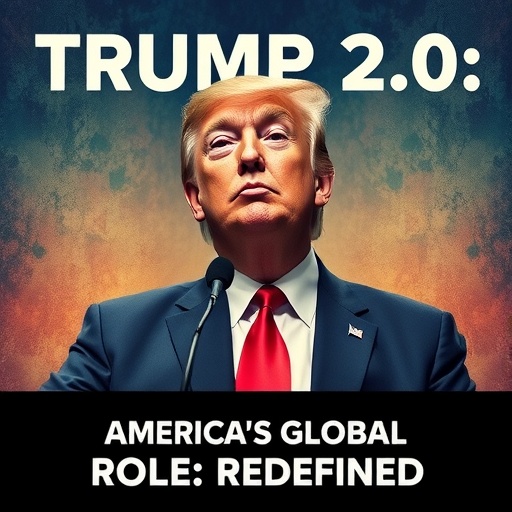In the dynamic landscape of international relations, the reconfiguration of global power dynamics has taken center stage. The forthcoming publication by I.A. Jasmin and I. Hosen titled “Trump 2.0: Redefining America’s Role in the Global Order” explores significant geopolitical shifts and assesses how these changes impact America’s standing on the world stage. As the digital age empowers nations and individuals alike, examining the implications of political narratives and their global repercussions becomes increasingly pertinent. This vital work emerges at a time when new alliances and rivalries are redefining what it means to be a superpower in the 21st century.
One core argument presented in the study delves into how America’s foreign policy is shaped by its domestic political climate. Particularly, the authors illustrate how political rhetoric influences diplomatic relations and public perceptions abroad. The influence of populism and nationalism within American politics, as exemplified by the Trump administration’s approach, has far-reaching implications. This point is particularly relevant given that domestic impulses often guide international agendas, reshaping allies and adversaries alike in complex and unpredictable ways.
The authors worry about the evolving nature of diplomacy as countries increasingly adopt aggressive postures. The China’s rise as a global superpower and its assertive territorial claims in the South China Sea serve as a cautionary tale for the United States. By asserting its influence, China indirectly calls into question the efficacy of the U.S. leadership model. The authors provide insightful analysis on how these developments necessitate a reassessment of America’s strategies to maintain its preeminence in global governance.
A critical examination of international trade policy presents another theme explored by Jasmin and Hosen. The authors argue that trade wars, particularly those waged between the U.S. and China, can destabilize established economic relationships, disturb multilateral agreements, and create hostile environments for future negotiations. The economic strategies employed by nations serve not only to fortify their positions but also to inspire emulation or resistance among other countries. It’s evident that the ramifications of these trade disputes extend beyond economics, signaling a shift in ideological approaches to globalization.
In demonstrating the intersection of technology and geopolitics, the authors highlight the rise of information warfare and cyber diplomacy. The advent of social media as a tool for political manipulation has transformed the way countries engage one another. Utilizing disinformation campaigns, foreign actors exploit social media platforms to sway public opinion and interfere in domestic elections. This underscores the necessity for the U.S. and its allies to bolster cybersecurity measures and safeguard democratic institutions from external threats and manipulation.
Moreover, the study examines how transnational issues such as climate change, pandemics, and cybersecurity increasingly necessitate cooperative responses. The authors emphasize that unilateral approaches to these global challenges are impractical and ineffective. As nations navigate these pressing threats, collaborative frameworks that encompass varied stakeholders are vital. Through this lens, the role of the U.S. could evolve from a hegemon to a more strategic partner, facilitating international dialogues aimed at sustainable solutions.
Central to this discourse is an exploration of the changing dimensions of American identity and values in a globalized context. The authors note that as America faces challenges both internally and externally, the essence of what it means to be American also shifts. The interplay of domestic sentiment with international responsibilities demands a nuanced understanding and proactive reevaluation of fundamental ideals like democracy, human rights, and equality. This introspection invites debates about America’s legacy and its future role in global narratives.
Throughout the publication, the authors engage with the notion of leadership in the new world order, suggesting that it requires adaptability and visionary strategies. Rather than simply maintaining the status quo, it is imperative for U.S. policymakers to recognize emerging trends and realities. Developing a responsive and flexible approach to diplomacy, international trade, and coalition-building could enable America to navigate starkly different global landscapes.
Furthermore, Jasmin and Hosen advocate for the necessity of reengaging with multilateral institutions and alliances. The authors argue that America’s withdrawal from organizations like the World Health Organization (WHO) and the Paris Agreement has consequences for its global reputation and influence. By actively participating in these international governance frameworks, the U.S. can restore its credibility and assert its role as a leader in addressing collective challenges.
A compelling aspect of the analysis lies in the consideration of the youth’s role in shaping future policies. The authors highlight how younger generations are increasingly engaged in societal issues, driven by technology and a collective consciousness about global challenges. Their perspectives and activism have the potential to transform traditional political discourse. Engaging with these voices can also provide innovative solutions that cater to the realities of a globalized world.
The final sections of the publication emphasize the importance of strategic storytelling in international relations. The authors posit that the narratives a country constructs around its policies significantly affect how those policies are received abroad. Crafting a cohesive and authentic narrative that resonates with both domestic constituents and international audiences may prove essential in redefining America’s diplomatic posture in a rapidly changing world.
In conclusion, “Trump 2.0: Redefining America’s Role in the Global Order” serves as a timely exploration of the multifaceted challenges and opportunities facing the United States as it navigates the uncharted territories of 21st-century geopolitics. By examining the intersection of domestic politics and international strategy, Jasmin and Hosen offer valuable insights that can inform future discussions on America’s role on the global stage.
Subject of Research: Redefining America’s role in the global order post-Trump administration.
Article Title: Trump 2.0: redefining America’s role in the global order.
Article References:
Jasmin, I.A., Hosen, I. Trump 2.0: redefining America’s role in the global order.
Discov glob soc 3, 140 (2025). https://doi.org/10.1007/s44282-025-00281-7
Image Credits: AI Generated
DOI: https://doi.org/10.1007/s44282-025-00281-7
Keywords: geopolitical shifts, America’s foreign policy, trade policy, information warfare, climate change, cybersecurity, multilateral institutions, youth activism, strategic storytelling.




